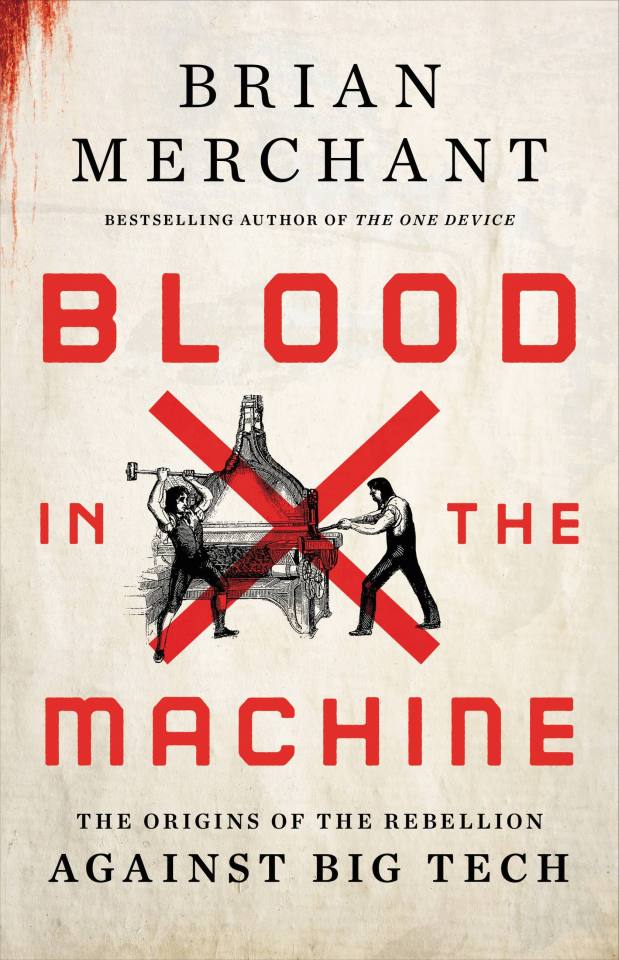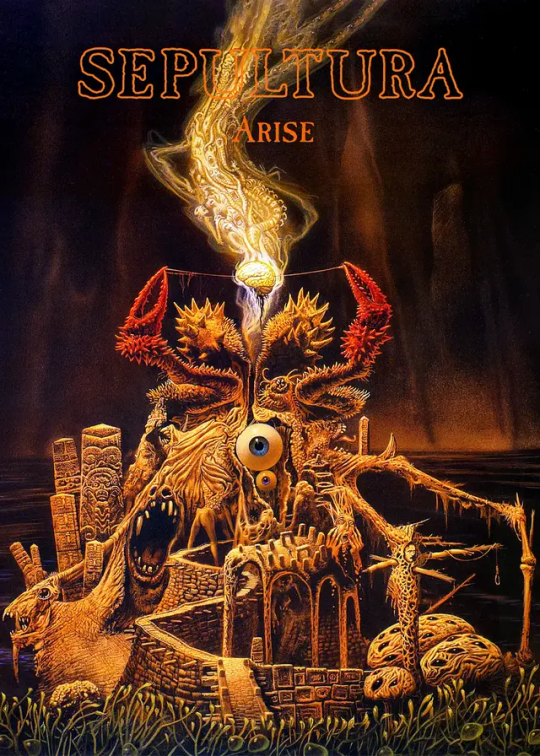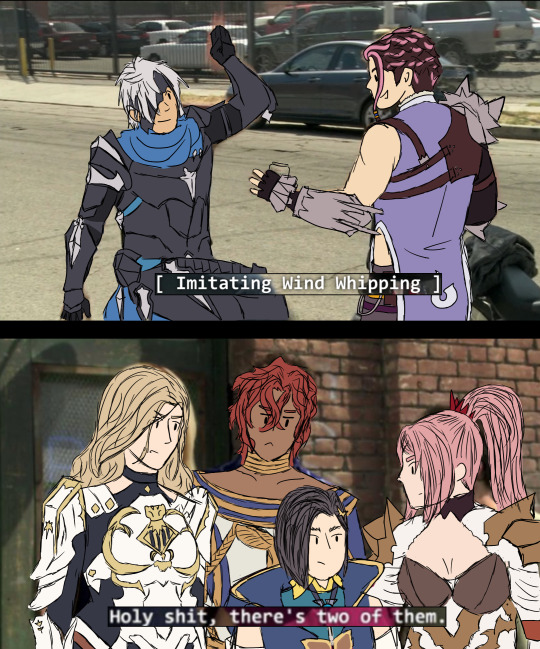#arise
Text

motoko kusanagi by takumi oyama
438 notes
·
View notes
Text
Brian Merchant’s “Blood In the Machine”

Tomorrow (September 27), I'll be at Chevalier's Books in Los Angeles with Brian Merchant for a joint launch for my new book The Internet Con and his new book, Blood in the Machine. On October 2, I'll be in Boise to host an event with VE Schwab.

In Blood In the Machine, Brian Merchant delivers the definitive history of the Luddites, and the clearest analysis of the automator's playbook, where "entrepreneurs'" lawless extraction from workers is called "innovation" and "inevitable":
https://www.littlebrown.com/titles/brian-merchant/blood-in-the-machine/9780316487740/
History is written by the winners, and so you probably think of the Luddites as brainless, terrified, thick-fingered vandals who smashed machines and burned factories because they didn't understand them. Today, "Luddite" is a slur that means "technophobe" – but that's neither fair, nor accurate.
Luddism has been steadily creeping into pro-labor technological criticism, as workers and technology critics reclaim the term and its history, which is a rich and powerful tale of greed versus solidarity, slavery versus freedom.
The true tale of the Luddites starts with workers demanding that the laws be upheld. When factory owners began to buy automation systems for textile production, they did so in violation of laws that required collaboration with existing craft guilds – laws designed to ensure that automation was phased in gradually, with accommodations for displaced workers. These laws also protected the public, with the guilds evaluating the quality of cloth produced on the machine, acting as a proxy for buyers who might otherwise be tricked into buying inferior goods.
Factory owners flouted these laws. Though the machines made cloth that was less durable and of inferior weave, they sold it to consumers as though it were as good as the guild-made textiles. Factory owners made quiet deals with orphanages to send them very young children who were enslaved to work in their factories, where they were routinely maimed and killed by the new machines. Children who balked at the long hours or attempted escape were viciously beaten (the memoir of one former child slave became a bestseller and inspired Oliver Twist).
The craft guilds begged Parliament to act. They sent delegations, wrote petitions, even got Members of Parliament to draft legislation ordering enforcement of existing laws. Instead, Parliament passed laws criminalizing labor organizing.
The stakes were high. Economic malaise and war had driven up the price of life's essentials. Workers displaced by illegal machines faced starvation – as did their children. Communities were shattered. Workers who had apprenticed for years found themselves graduating into a market that had no jobs for them.
This is the context in which the Luddite uprisings began. Secret cells of workers, working with discipline and tight organization, warned factory owners to uphold the law. They sent letters and posted handbills in which they styled themselves as the army of "King Ludd" or "General Ludd" – Ned Ludd being a mythical figure who had fought back against an abusive boss.
When factory owners ignored these warnings, the Luddites smashed their machines, breaking into factories or intercepting machines en route from the blacksmith shops where they'd been created. They won key victories, with many factory owners backing off from automation plans, but the owners were deep-pocketed and determined.
The ruling Tories had no sympathy for the workers and no interest in upholding the law or punishing the factory owners for violating it. Instead, they dispatched troops to the factory towns, escalating the use of force until England's industrial centers were occupied by literal armies of soldiers. Soldiers who balked at turning their guns on Luddites were publicly flogged to death.
I got very interested in the Luddites in late 2021, when it became clear that everything I thought I knew about the Luddites was wrong. The Luddites weren't anti-technology – rather, they were doing the same thing a science fiction writer does: asking not just what a new technology does, but also who it does it for and who it does it to:
https://locusmag.com/2022/01/cory-doctorow-science-fiction-is-a-luddite-literature/
Unsurprisingly, ever since I started publishing on this subject, I've run into people who have no sympathy for the Luddite cause and who slide into my replies to replicate the 19th Century automation debate. One such person accused the Luddites of using "state violence" to suppress progress.
You couldn't ask for a more perfect example of how the history of the Luddites has been forgotten and replaced with a deliberately misleading account. The "state violence" of the Luddite uprising was entirely on one side. Parliament, under the lackadaisical leadership of "Mad King George," imposed the death penalty on the Luddites. It wasn't just machine-breaking that became a capital crime – "oath taking" (swearing loyalty to the Luddites) also carried the death penalties.
As the Luddites fought on against increasingly well-armed factory owners (one owner bought a cannon to use on workers who threatened his machines), they were subjected to spectacular acts of true state violence. Occupying soldiers rounded up Luddites and suspected Luddites and staged public mass executions, hanging them by the dozen, creating scores widows and fatherless children.
The sf writer Steven Brust says that the test to tell whether someone is on the right or the left is simple: ask whether property rights are more important than human rights. If the person says "property rights are human rights," they are on the right.
The state response to the Luddites crisply illustrates this distinction. The Luddites wanted an orderly and lawful transition to automation, one that brought workers along and created shared prosperity and quality goods. The craft guilds took pride in their products, and saw themselves as guardians of their industry. They were accustomed to enjoying a high degree of bargaining power and autonomy, working from small craft workshops in their homes, which allowed them to set their own work pace, eat with their families, and enjoy modest amounts of leisure.
The factory owners' cause wasn't just increased production – it was increased power. They wanted a workforce that would dance to their tune, work longer hours for less pay. They wanted unilateral control over which products they made and what corners they cut in making those products. They wanted to enrich themselves, even if that meant that thousands starved and their factory floors ran red with the blood of dismembered children.
The Luddites destroyed machines. The factory owners killed Luddites, shooting them at the factory gates, or rounding them up for mass executions. Parliament deputized owners to act as extensions of law enforcement, allowing them to drag suspected Luddites to their own private cells for questioning.
The Luddites viewed property rights as just one instrument for achieving human rights – freedom from hunger and cold – and when property rights conflicted with human rights, they didn't hesitate to smash the machines. For them, human rights trumped property rights.
Their bosses – and their bosses' modern defenders – saw the demands to uphold the laws on automation as demands to bring "state violence" to bear on the wholly private matter of how a rich man should organize his business. On the other hand, literal killing – both on the factory floor and at the gallows – was not "state violence" but rather, a defense of the most important of all the human rights: the rights of property owners.
19th century textile factories were the original Big Tech, and the rhetoric of the factory owners echoes down the ages. When tech barons like Peter Thiel say that "freedom is incompatible with democracy," he means that letting people who work for a living vote will eventually lead to limitations on people who own things for a living, like him.
Then, as now, resistance to Big Tech enjoyed widespread support. The Luddites couldn't have organized in their thousands if their neighbors didn't have their backs. Shelley and Byron wrote widely reproduced paeans to worker uprisings (Byron also defended the Luddites in the House of Lords). The Brontes wrote Luddite novels. Mary Shelley's Frankenstein was a Luddite novel, in which the monster was a sensitive, intelligent creature who merely demanded a say in the technology that created him.
The erasure of the true history of the Luddites was a deliberate act. Despite the popular and elite support the Luddites enjoyed, the owners and their allies in Parliament were able to crush the uprising, using mass murder and imprisonment to force workers to accept immiseration.
The entire supply chain of the textile revolution was soaked in blood. Merchant devotes multiple chapters to the lives of African slaves in America who produced the cotton that the machines in England wove into cloth. Then – as now – automation served to obscure the violence latent in production of finished goods.
But, as Merchant writes, the Luddites didn't lose outright. Historians who study the uprisings record that the places where the Luddites fought most fiercely were the places where automation came most slowly and workers enjoyed the longest shared prosperity.
The motto of Magpie Killjoy's seminal Steampunk Magazine was: "Love the machine, hate the factory." The workers of the Luddite uprising were skilled technologists themselves.
They performed highly technical tasks to produce extremely high-quality goods. They served in craft workshops and controlled their own time.
The factory increased production, but at the cost of autonomy. Factories and their progeny, like assembly lines, made it possible to make more goods (even goods that eventually rose the quality of the craft goods they replaced), but at the cost of human autonomy. Taylorism and other efficiency cults ended up scripting the motions of workers down to the fingertips, and workers were and are subject to increasing surveillance and discipline from their bosses if they deviate. Take too many pee breaks at the Amazon warehouse and you will be marked down for "time off-task."
Steampunk is a dream of craft production at factory scale: in steampunk fantasies, the worker is a solitary genius who can produce high-tech finished goods in their own laboratory. Steampunk has no "dark, satanic mills," no blood in the factory. It's no coincidence that steampunk gained popularity at the same time as the maker movement, in which individual workers use form digital communities. Makers networked together to provide advice and support in craft projects that turn out the kind of technologically sophisticated goods that we associate with vast, heavily-capitalized assembly lines.
But workers are losing autonomy, not gaining it. The steampunk dream is of a world where we get the benefits of factory production with the life of a craft producer. The gig economy has delivered its opposite: craft workers – Uber drivers, casualized doctors and dog-walkers – who are as surveilled and controlled as factory workers.
Gig workers are dispatched by apps, their faces closely studied by cameras for unauthorized eye-movements, their pay changed from moment to moment by an algorithm that docks them for any infraction. They are "reverse centaurs": workers fused to machines where the machine provides the intelligence and the human does its bidding:
https://pluralistic.net/2021/02/17/reverse-centaur/#reverse-centaur
Craft workers in home workshops are told that they're their own bosses, but in reality they are constantly monitored by bossware that watches out of their computers' cameras and listens through its mic. They have to pay for the privilege of working for their bosses, and pay to quit. If their children make so much as a peep, they can lose their jobs. They don't work from home – they live at work:
https://pluralistic.net/2021/01/22/paperback-writer/#toothless
Merchant is a master storyteller and a dedicated researcher. The story he weaves in Blood In the Machine is as gripping as any Propublica deep-dive into the miserable working conditions of today's gig economy. Drawing on primary sources and scholarship, Blood is a kind of Nomadland for Luddites.
Today, Merchant is the technology critic for the LA Times. The final chapters of Blood brings the Luddites into the present day, finding parallels in the labor organizing of the Amazon warehouse workers led by Chris Smalls. The liberal reformers who offered patronizing support to the Luddites – but didn't imagine that they could be masters of their own destiny – are echoed in the rhetoric of Andrew Yang.
And of course, the factory owners' rhetoric is easily transposed to the modern tech baron. Then, as now, we're told that all automation is "progress," that regulatory evasion (Uber's unlicensed taxis, Airbnb's unlicensed hotel rooms, Ring's unregulated surveillance, Tesla's unregulated autopilot) is "innovation." Most of all, we're told that every one of these innovations must exist, that there is no way to stop it, because technology is an autonomous force that is independent of human agency. "There is no alternative" – the rallying cry of Margaret Thatcher – has become our inevitablist catechism.
Squeezing the workers' wages conditions and weakening workers' bargaining power isn't "innovation." It's an old, old story, as old as the factory owners who replaced skilled workers with terrified orphans, sending out for more when a child fell into a machine. Then, as now, this was called "job creation."
Then, as now, there was no way to progress as a worker: no matter how skilled and diligent an Uber driver is, they can't buy their medallion and truly become their own boss, getting a say in their working conditions. They certainly can't hope to rise from a blue-collar job on the streets to a white-collar job in the Uber offices.
Then, as now, a worker was hired by the day, not by the year, and might find themselves with no work the next day, depending on the whim of a factory owner or an algorithm.
As Merchant writes: robots aren't coming for your job; bosses are. The dream of a "dark factory," a "fully automated" Tesla production line, is the dream of a boss who doesn't have to answer to workers, who can press a button and manifest their will, without negotiating with mere workers. The point isn't just to reduce the wage-bill for a finished good – it's to reduce the "friction" of having to care about others and take their needs into account.
Luddites are not – and have never been – anti-technology. Rather, they are pro-human, and see production as a means to an end: broadly shared prosperity. The automation project says it's about replacing humans with machines, but over and over again – in machine learning, in "contactless" delivery, in on-demand workforces – the goal is to turn humans into machines.
There is blood in the machine, Merchant tells us, whether its humans being torn apart by a machine, or humans being transformed into machines.
Brian and I are having a joint book-launch tomorrow night (Sept 27) at Chevalier's Books in Los Angeles for my new book The Internet Con and his new book, Blood in the Machine:
https://www.eventbrite.com/e/the-internet-con-by-cory-doctorow-blood-in-the-machine-by-brian-merchant-tickets-696349940417



If you'd like an essay-formatted version of this post to read or share, here's a link to it on pluralistic.net, my surveillance-free, ad-free, tracker-free blog:
https://pluralistic.net/2023/09/26/enochs-hammer/#thats-fronkonsteen
#pluralistic#books#reviews#brian merchant#luddism#automation#history#gift guide#steampunk#makers#tina#inevitablism#reverse centaurs#amazon#arise
546 notes
·
View notes
Text

“Arise, take form this new era!”
These are the first words uttered of the fourth age of this world and its influence has been felt in the blondwood galleries of the moneyed to the silver bows of the flightships which now traverse the near sky and yet when the academy first laid eyes on the object of this change they had but one warning.
But that is not your story and that is not your time, play as a homunculi child of the fourth age of alchemy and discover a world bustling with the excitement and the tragedy of new frontiers; play as the child of the partyboy former Cavalry Captain of the 13th Company and Champion Equestrian who has spared no expense in raising you, explore both the gleaming towers and hidden underbelly of Candar, the familiar glades and slopes of your homeland and the striking landscapes of far away lands, dedicate yourself to your studies or aspire to a life beyond the grip of polite society.
The currency of this era is the much prized splinters of newsilver which have enabled so much of its progress and advancement, from the miracle of flight to the industrialisation of the Great Nations and even feats we call foul heresy but even this resource will not last forever. All the world now looks towards the next great find, towards whomever shall herald the fifth age.
That is your story.

Play as male, female or non-binary with options to be straight, gay, asexual or not pursue a romance at all.
Define your player character's demeanour, appearance, personality, history and skills — etiquette, riding, alchemy, artificing, bargaining and much more.
Choose the subject of your 5th year academic theory report and go out into the world to gather data in the field — by underhanded means or otherwise.
Explore the unique landscape and phenomena that proliferate across the land.
Court and pursue various romance options from the brave lancer-in-training, the untalkative classmate, your adroit childhood mate, the ambitious assistant or the unfamiliar guide.
Live in the vast world of Candar which is currently defined by the central discovery of the fourth age of alchemy — newsilver, the rare resource containing the energy which fuels all progress in Candar.
Enjoy this story which is an affectionate ode to my favourite childhood books and stories combining aspects of historical fantasy, steampunk and grimbright lore.

Cade/Cadena Fairfax, C
(m/f, 22) The Lancer-in-Training who also attends your school, the child of the now discredited and proscribed Commander of the Librarian Knights of Gallopavia. Despite this fact they remain boarded at Gallo, their aspirations still intact though know they hope to find the truth or bring their father to justice.
A halfling (human).
Petr/Petra Guy, P
(m/f, 21) The Apprentice to the Lord Artificer of Gallopavia, your childhood best friend has changed much in the years since you last saw them. Perhaps the gruelling work as an apprentice or the weight of their gratitude has pushed them forward but you can't help but notice the youthful spark in their eyes has been replaced by determination.
A halfling (human) of some indeterminate heritage.
Jacquelin/Jacqueline Attica, J
(m/f, 22)
An Archivist of the Grand Alchemical Library and fellow 5th year student at Gallo Academy widely regarded as a prodigy and future professor at least, known to perform their tasks in total silence efficiently if it weren't for their cold demeanour and standoffish personality they'd quickly rise through the ranks of society. However when pushed they make no secret of their feelings about their peers, useless.
A sylph of some halfling (human) heritage.
Euer Ffsonye, E
(m/f, 29) The Assistant Professor of Flight at Gallo Academy, the much lauded junior newsilver researcher has quickly adapted to the position of educator easily stepping into the dangerous politics of alchemy and invention without so much as a stumble. But amongst the disgruntled who they've surpassed and outrank, they ask: what is it they're really gunning for?
An halfling (human) of some aelfe heritage.
Nate/Nata Bors-Sutr, N
(m/f, 19) The Flightship Navigator from the Free States who your father hired to act as your guide, over the years they've acquired enough practical skills to get by and earn their keep and as someone accustomed to the dark corners and avenues of this land beyond the prying eyes of the authorities they know how to find the things that others can't see.
A slyvan of some halfling (human) heritage.

Candar
The fourth age of alchemy will end with man weeping at the denouement, the tragedy of its conclusion is already known yet we can do nothing to fight against it.
Candar is the known world, its are people spread across many nations, banners and beliefs for which they regularly live and fight.
It is currently in the fourth age of alchemy defined primarily by the substance newsilver — the absolute focus of all industrial, alchemical and scientific progress which has rapidly changed the lives of the humanoids which inhabit this world drawing everyone towards it's bustling cities, enabling faster travel via its flightships, dangerous work from it's factories and bloodier wars from the newmuskets they have produced.
Candar remains filled with undiscovered and unexplored corners in which magical meetings still happen but the world is less fantastical, its uncharted territories are darker, further and yet more accessible than they ever have been.

Demo: unreleased (WIP)
References: unreleased (WIP)
Ko-fi: unreleased
Other projects: GGGLU (check it out!)
#arise#arise-if#status: no demo#dashingdon#choicescript#interactive fiction#genre: fantasy#genre: steampunk
172 notes
·
View notes
Text



𝔐𝔢𝔱𝔞𝔩 𝔞𝔩𝔟𝔲𝔪 𝔞𝔯𝔱
𝔖𝔩𝔞𝔶𝔢𝔯 - 𝔖𝔬𝔲𝔱𝔥 𝔒𝔣 ℌ𝔢𝔞𝔳𝔢𝔫 𝔞𝔯𝔱 𝔟𝔶 𝔏𝔞𝔯𝔯𝔶 ℭ𝔞𝔯𝔯𝔬𝔩𝔩
𝔖𝔢𝔭𝔲𝔩𝔱𝔲𝔯𝔞 - 𝔄𝔯𝔦𝔰𝔢 𝔞𝔯𝔱 𝔟𝔶 𝔐𝔦𝔠𝔥𝔞𝔢𝔩 𝔚𝔥𝔢𝔩𝔞𝔫
𝔐𝔢𝔤𝔞𝔡𝔢𝔱𝔥 - 𝔓𝔢𝔞𝔠𝔢 𝔖𝔢𝔩𝔩𝔰… 𝔅𝔲𝔱 𝔚𝔥𝔬'𝔰 𝔅𝔲𝔶𝔦𝔫𝔤? 𝔞𝔯𝔱 𝔟𝔶 𝔈𝔡 ℜ𝔢𝔭𝔨𝔞
#art#metal album art#thrash metal#metal#80's#90s#classic album#slayer#south of heaven#sepultura#arise#megadeth#Peace Sells... But Who's Buying?#Larry Carroll#Michael Whelan#Ed Repka#artwork#painting#illustration#illustrations
362 notes
·
View notes
Text

I "WISH" you a Good Morning!!!
#good#morning#good morning#good morning message#good morning image#good morning images#good morning man#the good morning man#the entire morning#gif#good morning messages#gm#morning vibes#morning motivation#dawn#sun#the sun#arise#sunrise#sun rise#wizard#mage#spellcaster#wizard posting#magic#spell#every day#magic user#sorcerer
84 notes
·
View notes
Text

May compassion be part of our deepest nature. Let it arise from our interconnection with all things.
-james lee jobe
274 notes
·
View notes
Text

#Sepultura#arise#dead embryonic cells#cavalera#thrash metal#murder#altered state#beneath the remains#roots#slayer#sodom#possessed#soulfly#pantera#kreator
59 notes
·
View notes
Text

First look at Eve as Carole Middleton in The Crown - Season 6 Part 2
The universe really said "how much can Eve Best Nation take all at once?" and we're all over here like

#when I tell you I screeched#we are being FEDDDD#eve best nation#arise#eve's been busy#that's so like her to disappear and then BAM#HOTD trailer#The Crown#she's an icon really#eve best#how are we all doing as a collective? 😂
78 notes
·
View notes
Text

Frederic James Shields: The Annunciation
"Arise, shine, for your light has come, and the glory of the Lord rises upon you." Isaiah 60:1
#arise#bible quotes#Bible#Isaiah 60:1#God#Jesus#Christ#Jesus Christ#Father#Son#Holy Spirit#Holy Trinity#christian religion#faith#hope#love#stress reliever
179 notes
·
View notes
Text
I'LL GET YOU NEXT TIME GRRRR

didn't get neuvillette but atleast arle is guaranteed...
31 notes
·
View notes
Text

#i <3 the early game alphen and law interactions theyre so funny#t#my art#tales of#arise#tales of arise#law arise#alphen arise#shionne imeris#rinwell arise#kisara arise#dohalim il qaras#erm... cheesed to meet you? sorry if im filling the tag idk who else is arise posting these days#anyways TWO MEME POSTS IN ONE NIGHT??? so unusual for me
88 notes
·
View notes
Text


motoko kusanagi by takumi oyama
484 notes
·
View notes
Text

Ephesians 5:14 (NKJV) -
Therefore He says:
“Awake, you who sleep,
Arise from the dead,
And Christ will give you light.”
91 notes
·
View notes
Text
Wanna read a fun WebNovel?
Want to start reading webnovels, but don't know where to start?
Simply search on google which novel you want to read or go to the WebNovel app to start.
Here are some beginner friendly recommendations that are fun to read:
>The Author's POV
>The Beginning After the End *
>Supremacy Games
>Omniscient Readers Viewpoint*
>Shadow Slave
>Only I Level Up (Solo Leveling)*
>Trash of Count's Family*
The above novels are GREAT, no doubts about it. BUT if you want absolute gems, then read these:
>Lord Of The Mysteries (Book 1 Completed, Book 2 Ongoing)
>Reverend Insanity (Completed)*
Don't be overwhelmed by the number of chapters in these books, take it slow with one of the books I mentioned above and then move onto the LoTM, RI or SG which have over 1000 chapters.
Many Webnovels also have Webtoons, if you want to know more about how the characters look or want to see Illustrated scenarios from the novels, you can read those Webtoons. I have marked Novels that have Webtoons with a (*).
Start reading webnovels to find your favorite genre, once you do you can drop a comment/reply to ask for more recommendations based on your favorite genre!
HAPPY READING!!!!
#webtoon#webnovel#shadow slave#lotm#lord of the mysteries#trash of the count's family#solo leveling#sung jin woo#arise#novel#cultivation novel#the fool#blog#first post#hobby#reading#books#book recommendations#anime
88 notes
·
View notes
Text

𝔖𝔢𝔭𝔲𝔩𝔱𝔲𝔯𝔞
#Sepultura#max era#igor era#max cavalera#igor cavalera#andreas kisser#paulo jr#metal#thrash metal#90's#beneath the remains era#arise#classic era#brazil
89 notes
·
View notes
